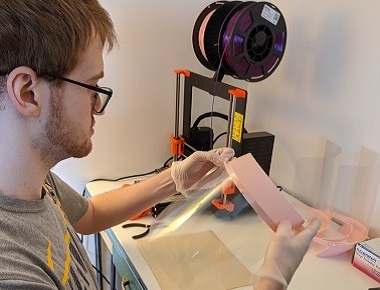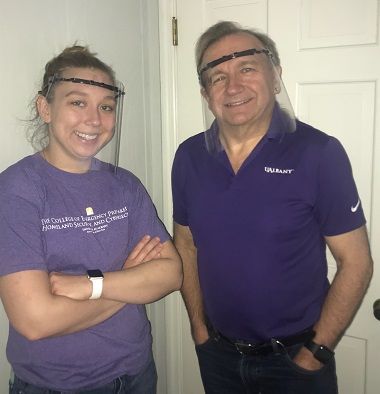UAlbany Uses 3D Printers to Help Meet the COVID-19 PPE Shortage
ALBANY, N.Y. (April 7, 2020) – As cases of COVID-19 continue to rise in New York, students, faculty and staff at UAlbany are taking initiative to help meet shortages in personal protective equipment (PPE) for hospital personnel and other first responders across the state.
CEAS/CEHC Leverage Their Expertise and Technology

Jonathan Muckell, a professor of practice in the Department of Electrical and Computer Engineering, has mobilized 20 College of Engineering and Applied Sciences (CEAS) students to create and assemble three-piece medical face shields using 3D printed parts.
The design, created by the National Institutes of Health (NIH), was approved on Monday. Students are now starting production and assembly. The Albany STEAM Garden is offering its printers to assist with production. Once completed, the face shields will be donated to local hospitals and other first responders for as long as they are in need.
“I am extremely proud of our student volunteers,” said Muckell. “Engineers are problem-solvers. They were incredibly eager for the opportunity to do something constructive during this crisis.”
"The Albany STEAM Garden incubator is proud to be participating in this effort by supplying all of its high-output 3D printers to assist in the production of the PPE gear for medical workers,” added Anthony Capece, the STEAM Garden’s executive director. "We could never have imagined a better utilization of our production equipment. We are proud to team up with UAlbany, who always seem to be at the forefront of innovation and community engagement.”
Faculty and students in the College of Emergency Preparedness, Homeland Security and Cybersecurity are also working on medical face shields using 3D printed parts available through their creative makerspace.

The college is partnering with Rancher Labs to design the face shields that faculty and staff are now printing and assembling, along with staff from the Albany Public Library. More than a dozen of their prototypes were sent to Albany Med last Monday and already in use; the Rensselaer County Bureau of Public Safety has also expressed interest in donations.
Both CEHC and CEAS plan to scale-up production and donate hundreds of face shields.
“At CEHC, we train our students to make a difference — as first responders, as information managers and as emerging technologists,” said Jen Goodall, the college’s vice dean. “Once again, our students, faculty and staff have risen to the challenge and are working with our community, private and alumni partners to make a difference.”
“We have been overwhelmed by the unwavering support of our community,” said Fred Venditti, executive vice president for system care delivery at Albany Med and hospital general director. “The donation of 3D printed face shields from UAlbany’s CEHC and Rancher Labs helps us ensure we have an adequate supply of personal protective equipment to support our healthcare workers who are working so tirelessly on the frontlines to care for patients.”
“As an open-source company, community is in our blood and at the heart of everything we do at Rancher Labs,” added Mark Abrams, field engineer at Rancher Labs. “Community is a responsibility we take very seriously, and we are privileged to have our employees collaborating with UAlbany to support their efforts in delivering personal protective equipment.”
PPE Inventory on Campus
The University’s various entities have answered the call to donate PPE inventory as well, including: the University Police Department (UPD), Office of Facilities Management, the Office of Environmental Health & Safety, Student Health Services, Five Quad Volunteer Ambulance Service, research labs, the University Art Museum and the Health Sciences Campus.
Equipment such as surgical masks, gowns and gloves have been – and will continue to be – donated to local hospitals and first responder agencies.




